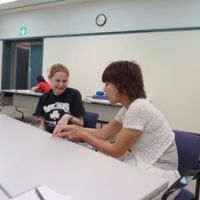Minato International Association, which arranges activities and programs mainly for foreign residents in Minato Ward, Tokyo, offers a unique program in which Japanese volunteers give foreigners individual Japanese conversation lessons.
According to Masahiro Otomo, managing director of MIA, the program was launched a decade ago and now has about 50 registered Japanese volunteers and 30 foreigners taking part.
Minato Ward, which hosts the embassies of 77 countries, is unique for its large number of foreign residents. According to the Minato Ward Office, 21,945 foreign residents from 128 countries were registered in the ward as of October, accounting for more than 10 percent of its total population of 205,082.
The association was established in 1992 under the ward office to meet the needs of local foreign residents, Otomo said.
Initially, the association was funded entirely by the ward office, but due to financial reasons, its ties to the office were severed last year. Now, apart from the fees that it collects from its registered members, the association has to find funding or apply for grants to keep its activities going. "We're having a very hard time (securing funding)," said Otomo.
Naoko Shiratori, a volunteer at the association who started the Japanese conversation partner program, said that when she first began volunteering for MIA's advisory service for foreigners, she found that the main reason foreigners came to the consultations was out of frustration at a lack of opportunities to try out their Japanese conversation skills. That in turn led her to launch the conversation program.
In the program, Shiratori matches up a Japanese volunteer with a foreigner who wants to practice Japanese conversation. Same sex matches are made to avoid complications, she said. The two people then decide the date, time and place for the lesson, and take it from there.
Shiratori said that when she first started the program, she sometimes faced problems such as a male Japanese volunteer asking to be partnered with a Chinese woman, thinking that the program offered the chance to become friends with foreigners. Such misunderstandings were overcome after she clearly explained the purpose of the program.
Today, more than half of the foreign participants are South Koreans, mainly spouses of businessmen and diplomats who experience difficulty finding a place to try out their Japanese, she noted.
Shiratori speculated that the reason a lot of South Koreans take part in the program is because they still have difficulty finding footing in Japan compared with Americans and Europeans, who have already established their own local communities. "It's really nice if both Japanese and foreigners can enjoy the lessons and build a good, long-term relationship," she said.
In addition to the conversation program, MIA offers a number of other programs throughout the year, including language learning classes covering Japanese, English and Chinese, lectures in English on Japanese culture, mountain hiking tours for both Japanese and foreigners, and Japanese cooking lessons.
The association also offers the "Let's Chat in Japanese" program, which started in 1993. It is organized monthly, and between 15 to 20 Japanese and foreigners take part. Foreign participants are divided into several groups and talk freely in Japanese for 1 1/2 hours.
A Japanese-American man in his late 30s from the U.S. who has participated in the program several times said he really enjoyed it and found it helpful because he didn't get a chance to talk in Japanese much in everyday life. He said he worked for an American company where most of his colleagues spoke English, and he didn't even talk in Japanese to his Japanese wife, because she spoke fluent English. "I searched for free Japanese lessons on the Internet, and came across this program," he said.
As MIA nears its 20th year, one of the challenges it faces is its shortage of Japanese volunteers, said Otomo. "Many Japanese hesitate to volunteer, because they say they have poor English ability, but you don't need to be able to speak fluent English to do volunteer work," he said, because most of the programs that MIA offers "are done in Japanese."
He said that the association's future goal is to offer programs and activities that meet the needs of foreigners as much as possible. "People don't take part in programs that they don't find interesting or attractive," Otomo said, adding that only six people came when they held a tour at a waste disposal facility.
Otomo noted that the organization needs to think more from a foreigner's point of view. "At the moment, 90 percent of our 250 members are Japanese. We want to change that, and make it half-Japanese and half-foreigners," he said.
"We want to reach out to foreigners and find out exactly what their needs are, and to train more and more Japanese volunteers who can fulfill those needs. We want to do activities that only we (MIA) can do."
For more information on MIA, visit www.minato-intl-assn.gr.jp, call (03) 6440-0233 or e-mail [email protected]



















With your current subscription plan you can comment on stories. However, before writing your first comment, please create a display name in the Profile section of your subscriber account page.